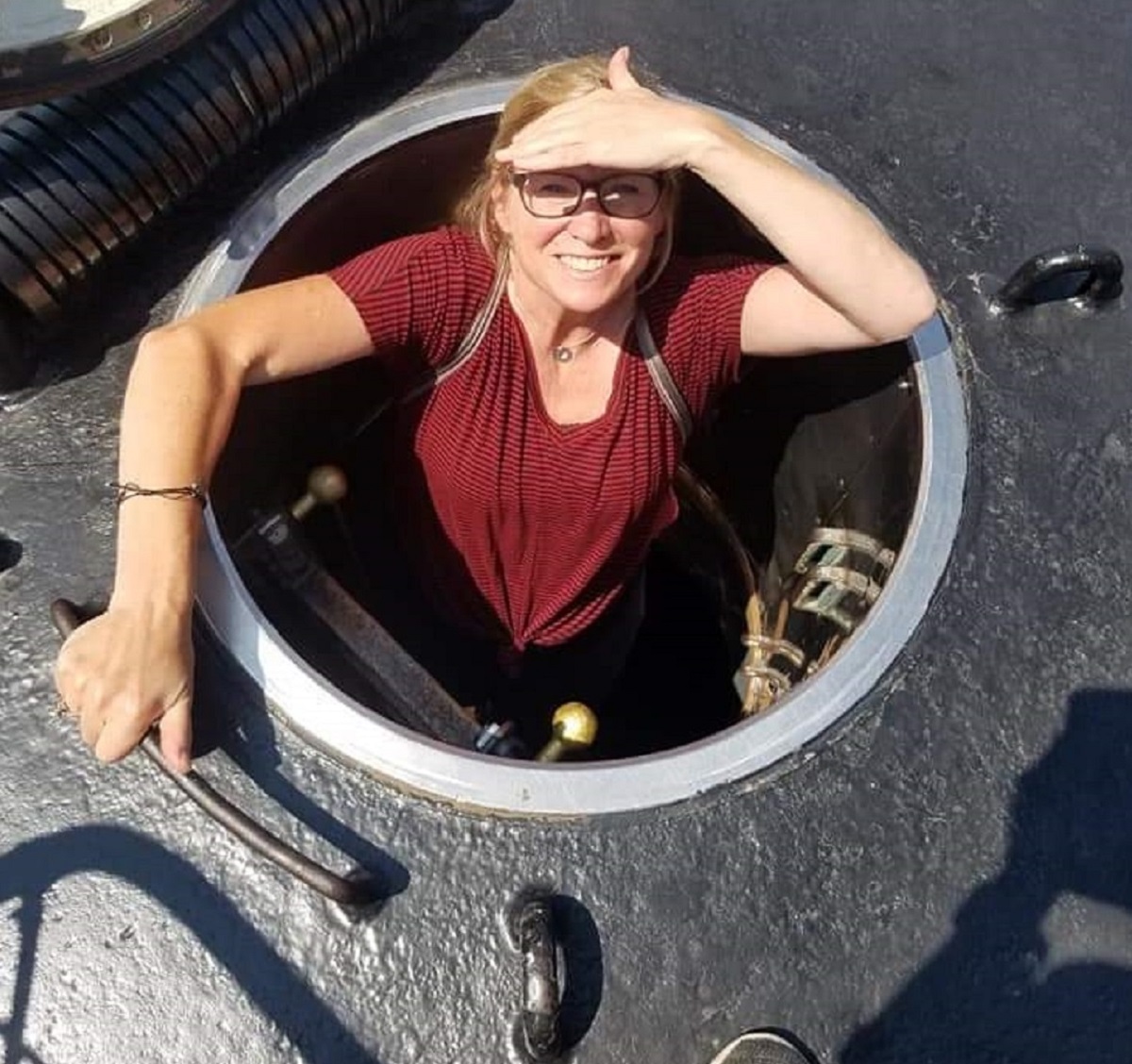Julie Lowe’s life lessons in environmental stewardship began early.
Some of her fondest early memories are of accompanying her maternal grandfather, Ray, on his rounds at Spring Mill State Park in Mitchell, Indiana, where he was the property manager. “It was when I was about four through seven years old, and I remember riding around with him in his green Department of Natural Resources truck,” she says. “I felt I was like him; it was my park and I was taking care of it. He was my idol.” Together they also explored trails and caves, and foraged for morels and persimmons.
After her parents, Betty and Jerry, divorced when Julie was in fourth grade, her mom’s boyfriend expanded her awareness of nature. “Randall could be thrown into the woods with a knife and canteen, and survive,” Lowe says. Some important lessons he taught her: caring enough not to step on bugs; respecting nature and not changing what you find there; and learning that she didn’t have to convince folks who judged her for these beliefs, but could walk her path and be true to herself. “So I guess he taught me about conservation,” she muses.
Years later, the Sierra Club would become the beneficiary of such formative experiences in nature.
Lowe now lives in Columbus, Indiana, with her second husband, Mark, and their son Donovan (12), as well as her older sons Morgan (24) and Brendon (21). “Donovan keeps us young; he’s a blessing,” she says. He was two when Lowe retired in 2008, after 22 years working as a magnetic resonance technologist. She gravitated to that career after spending time at her mom’s radiology office job. She graduated from Indiana University at Bloomington and completed her requirements at its School of Medicine in Indianapolis. Retirement opened her life to things that make her happy—spending more time with Donovan as he grows up and volunteerism.
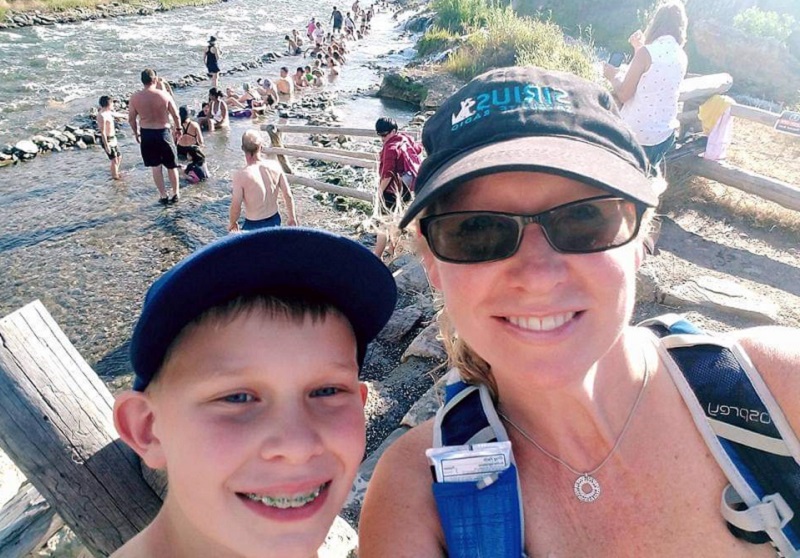
Donovan and Julie at Yellowstone National Park's Boiling River "hot pot"
The Lowes joined the Sierra Club in 2011, not realizing that local groups existed, let alone that there was one in Columbus. Julie was surprised when the local group mailed postcards inviting residents to a picnic in 2014. She and Morgan attended, enjoying what she recalls as a “wonderful day.” Arriving home she told Mark, “I found our friends! I know where they are now, and it’s going to be OK because there are people like us!” After living in Columbus for four years without making close friends, they were thrilled. “We didn’t realize how much we wanted a tribe until we found them,” Julie says.
In 2015 Julie attended her first rally, in Indianapolis, to advocate for clean power. At the same time, she became active in the Sierra Club’s Winding Waters Group, which partners with Hoosier Riverwatch, a program under the Indiana Department of Environmental Management (IDEM). Citizens help monitor local streams for toxic pollution; Lowe is both a monitor and an instructor for the program.
Volunteers test water samples and enter the results into a public database. A major source of concern for the last four years in Bartholomew County, where Columbus is located, has been runoff from concentrated animal feeding operations, or CAFOs. Winding Waters opposes “factory farming” and views water testing as a way to draw the public’s eye to toxic CAFO pollution, which is largely composed of animal waste.
Lowe acknowledges the highs and lows of water testing, saying, “It’s a good tool; people know we’re out there being watchdogs.” At the same time, it’s frustrating. “We see and monitor pollution, but IDEM can’t do anything about it due to lack of staff and funding,” she says.
Testing is what Winding Waters is best known for, though it also fights irresponsible deforestation in Indiana, speaks out against gerrymandering in its legislative districts, and organizes year-round nature hikes.
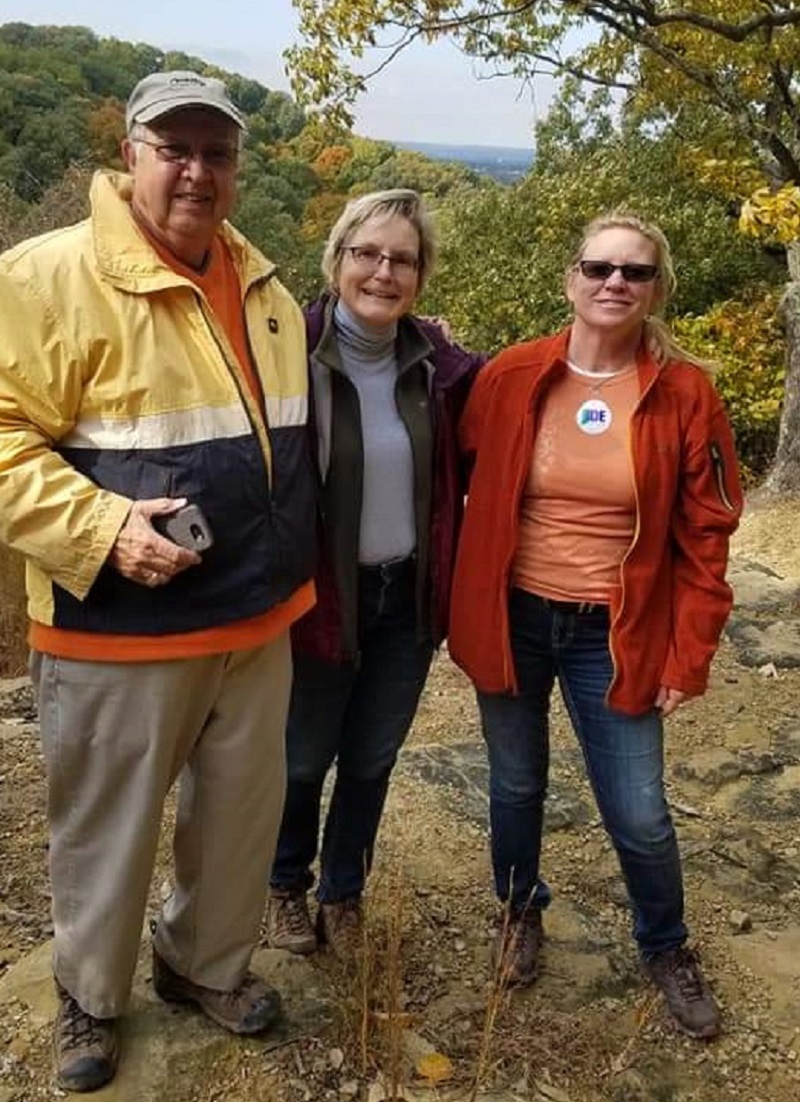
Winding Waters Outings Committee members Joe Bronnert, Rebecca Lorenz, and Lowe in Jackson Washington State Forest, Indiana
Lowe has served as chair of Winding Waters since 2016, and has been on the executive committee of the Sierra Club’s Hoosier Chapter since 2017. Last month she was elevated to two other positions: chair of the Hoosier Chapter and delegate to the Council of Sierra Club Leaders. The latter meets annually and functions as a regional advisory group to the Club’s board of directors.
But to assume that Lowe’s volunteering cup runneth over would be to underestimate her tenacity.
In November, 2017 Lowe attended a Grassroots Network training in Washington, D.C., with Winding Waters colleagues Michelle Carr and Rebecca Lorenz. Back home, they decided to start a brand new campaign. They secured a Grassroots Network grant, and last year the Pollinator and Pollinator Habitat Protection Campaign was born.
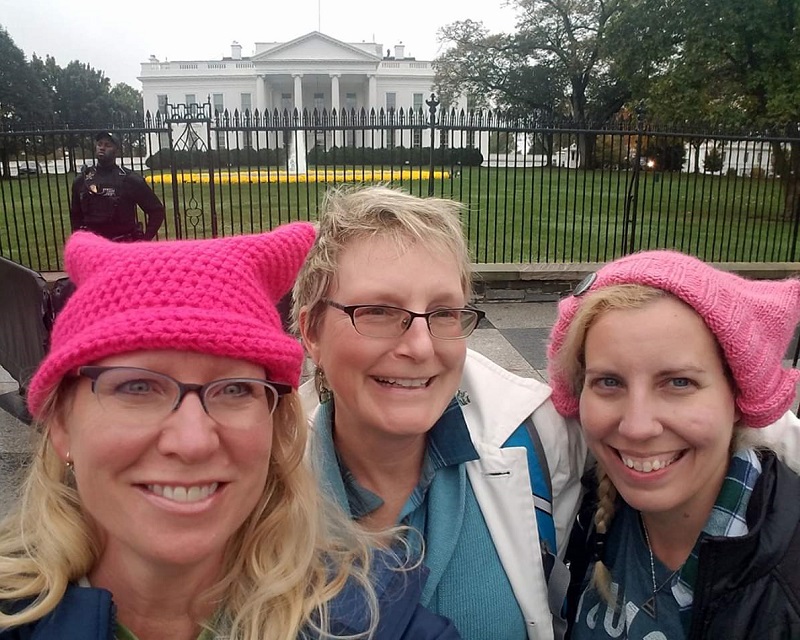
Grassroots Network training in Washington, D.C., Nov., 2017-- Lowe, Rebecca Lorenz, and Michelle Carr
The group decided to sell native pollinator-friendly plants locally. In order to raise awareness, they performed community outreach from a Sierra Club–sponsored booth at the local farmers market. They tabled there for six weeks, educating their neighbors about pollinators—what they are, why they’re important, and how pesticides contribute to dwindling populations. “We weren’t just preaching to the choir—everyone came up to us, asked questions, and learned,” says Lowe. With locals newly ready to support pollinators, a custom order was placed with a restoration nursery.
Ideas germinated along with the native plants, and the group realized it could use grant money to buy not only plants but seeds for sowing there in Columbus. “Seeds, like Johnny Appleseed!” says Lowe. They partnered with local schools and the city Parks Department to create public pollinator gardens around town, and the school connection grew into a relationship that Lowe particularly cherishes.
The campaign has multiple beneficiaries, such as community schools and city parks, but two education partners—a parochial school and a public school that practices project based–learning—have received the most funding by the Grassroots Network. Kids had already starting learning about the threats to pollinators and were natural allies, and the schools were open to allowing a garden to be installed.
In May, first graders will add to the garden plants that are currently being raised from seed in their classrooms, with a plan for the kids and their families to maintain them over the summer. Grassroots Network grant funds have paid for plant boxes and installation of a donated greenhouse, and high school trade classes are stepping up to build bat boxes and bee hotels for the gardens. The campaign also distributed 200 t-shirts to its kids, featuring images of pollinators on native flowers.
It seems safe to say that the Columbus community is now aware of pollinators and the Sierra Club. “I’m amazed at how big the pollinator movement is,” says Lowe. “People now know what the Sierra Club is; it’s referenced on things they see and hear around them.”
In a place where politics often creates division—for example the bitterly fought CAFO and deforestation issues—pollinators offer a respite. “This is one thing everyone can embrace,” says Lowe. “The Sierra Club is the driving force, and is accepted by community leaders and institutions. That’s why I’m so motivated—everything is going right with the pollinator project. It’s a great feeling.”
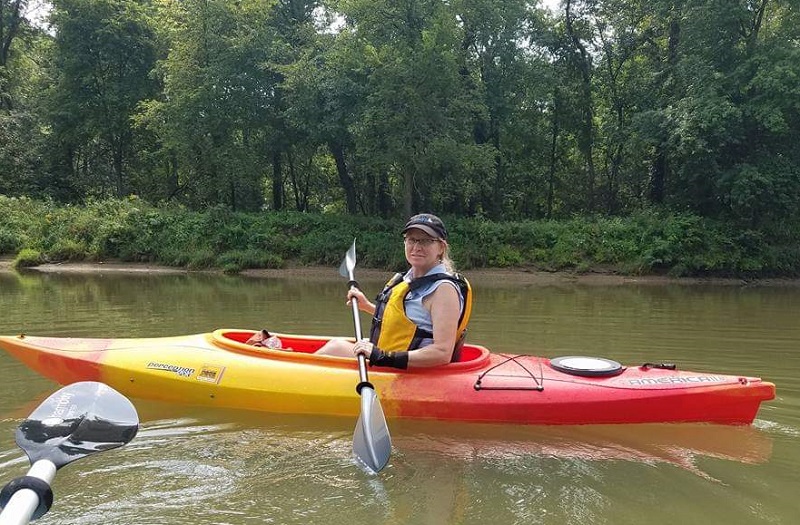
Lowe in one of her happy places -- kayaking down an Indiana River
